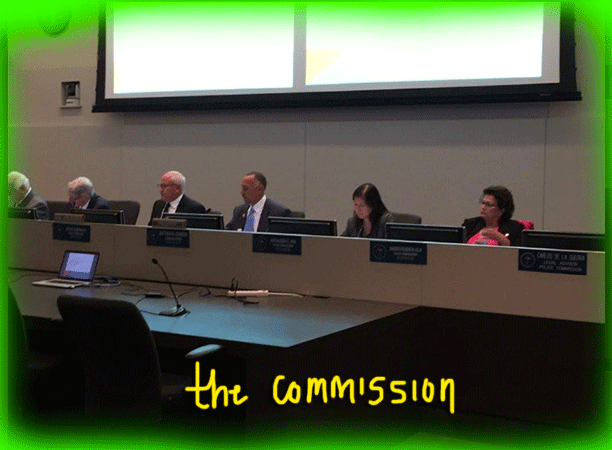LA MAYOR TAPS LIBERTY HILL PREZ FOR LA POLICE COMMISSION SEAT
On Monday, Los Angeles Mayor Eric Garcetti nominated Shane Murphy Goldsmith to replace outgoing Kathleen Kim on the LA Police Commission.
Goldsmith is a member of the LA Homeless Services Authority Board of Commissioners, the President and CEO of Liberty Hill Foundation, and co-chair of the California Executive Alliance for Boys and Men of Color in Southern California.
Before Goldsmith started working at Liberty Hill, she worked under (then) City Council President Eric Garcetti, as a senior advisor, and focused on housing, public safety, the budget, and LGBTQ issues. Goldsmith also served as the executive director of an affordable housing development group called PATH Ventures.
Goldsmith has “a well-earned reputation for fair-mindedness, and a deep sense of compassion that informs everything she does,” Mayor Garcetti said. “She is a thoughtful leader who has worked closely with the officers who serve L.A.’s neighborhoods, and who truly understands the urgency of conversations about the future of law enforcement, how and when deadly force should be used, and strengthening trust between the LAPD and communities of color.”
Kim, who is stepping down after serving on the commission for three years, is a law professor and expert on immigration and human trafficking.
Garcetti praised Kim for “fighting to protect and improve the LAPD’s relationship with L.A.’s immigrant communities, and playing a key role in developing the Department’s homelessness policy.”
The LA City Council still has to officially confirm Goldsmith to the commission.
INMATES KICK OFF MASSIVE NATIONWIDE PRISON STRIKE OVER PRISON SLAVERY
On Friday, the 45th anniversary of the 1971 Attica Prison riot in New York, inmate workers launched a nationwide labor strike.
Prisoners across the US are conducting a coordinated protest against conditions inside America’s prisons, including forced prison labor that either doesn’t pay inmates anything at all, or pays them pennies per hour.
The strike was largely organized by the Free Alabama Movement, a prisoner-led human rights group, which designated Friday, September 9, as a National Day of Solidarity to End Prison Slavery. All inmates at Holman Prison, FAM’s main hub, peacefully declined to show up to their prison jobs Friday, leaving officers to take on the work.
“To every prisoner in every state and federal institution across this land, we call on you to stop being a slave, to let the crops rot in the plantation fields, to go on strike and cease reproducing the institutions of your confinement,” the FAM leaders write.
Inmates are reportedly striking in 40 correctional facilities in 24 states including California. The strikers are joined by people protesting and rallying in cities nationwide including Portland, Los Angeles, Oakland, Phoenix, Atlanta, and Chicago.
Writing for Vice and the Influence, formerly incarcerated writer Jeremy Galloway has more on the ongoing strikes. Here’s a clip:
Prior to the official strike kickoff, inmates at Holmes Correctional Institution, in the Florida panhandle, led an uprising that forced the facility to be shut down. More than 400 inmates participated in that rebellion, which the prison administration has linked to the national strikes.
As the list of facilities involved expands, the South continues to lead the way. Prisoners in multiple Alabama prisons, at least two other Florida prisons, Fluvanna women’s prison in Virginia, and prisoners in North Carolina and South Carolina all reportedly engaged in various forms of resistance. Most Georgia prisoners don’t work on Fridays, but some on-the-ground reports indicate that they plan to join the actions when their work week begins today (September 12).
But the South does not stand alone. More than 400 prisoners at Kinross Correctional Facility, Michigan, held a protest on the prison yard and caused property damage to the prison, prompting officials to transfer 150 of them to other facilities. Clallam Bay Correctional Center in Washington State is also said to be on lockdown after actions there.
Many women prisoners are involved: Those held at Central California Women’s Prison, a women’s prison in Nebraska, at Lincoln (Nebraska) Correctional Center, a women’s prison in Kansas, and at Merced Jail in California have either refused to work, are on hunger strike, and/or have led uprisings in their facilities, I’m told.
It’s significant that so much of the resistance is focused on women’s facilities (although this certainly isn’t without precedent: The 1974 Bedford Hills and 1975 North Carolina Correctional Institute for Women uprisings are two of the most significant events in US prison history). Women, especially young women of color, make up the fastest-growing corrections population, at least in local jails. And the history of resistance in US women’s prisons continues to rapidly unfold, even if the media pays it little attention.
The actions haven’t been limited to jails and prisons, either. Friends, family, and supporters of incarcerated people took to the streets across the country to express solidarity and support for the strikes. Atlanta, Arizona, Portland, Lucasville (Ohio), Pittsburgh, Milwaukee, St. Louis, New York, Providence, Richmond, Durham, Austin, Denver, Los Angeles, and plenty of other large and small US cities have seen protestors, sometimes numbering into the hundreds, take to the streets or picket prisons.
In Atlanta, where I live, about 50 people disrupted business Friday at Wendy’s, McDonald’s, Starbucks, and Aramark—companies that have been accused of exploiting barely compensated incarcerated labor—during street protests. According to witnesses, police responded by trying to run over protesters and dousing protesters, bystanders, and one another with pepper spray.

